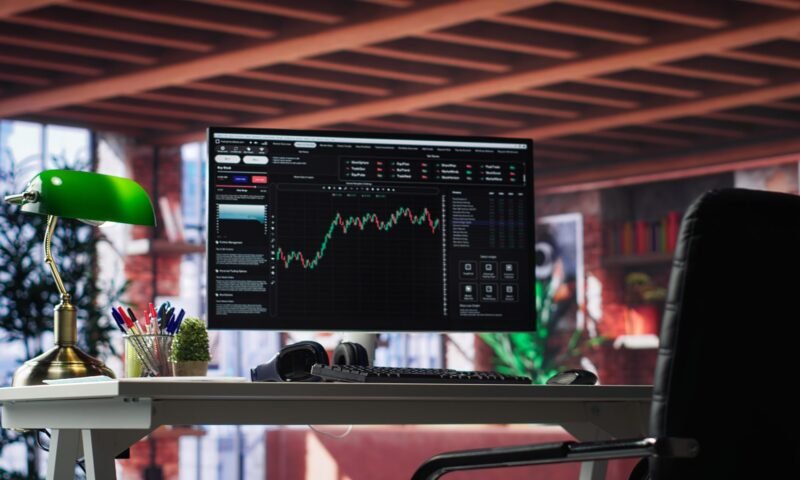
Futures trading is an essential part of private trading. It allows traders to speculate in global markets using capital provided by the company rather than personal funds. The model focuses on skill, discipline and risk management, rewarding traders who can perform consistently.
A futures contract represents an agreement to buy or sell an asset at a specific price on a specific date. These assets include commodities, stock indices like the S&P 500, and even cryptocurrencies. Traders can also explore futures trading on the Nasdaq to understand how index futures shape broader market strategies. Because traders can profit from rising and falling prices, futures contracts offer flexibility that few other instruments do.
How futures work in prop trading
Futures contracts are traded on centralized exchanges such as the Chicago Mercantile Exchange (CME), ensuring transparency, liquidity and uniform pricing. Each contract has a specific size and expiration date, allowing traders to calculate exposure and manage risk efficiently.
The power of futures lies in leverage. A small margin deposit controls a large position, magnifying profits and losses. Support companies prefer this structure because it allows them to allocate capital efficiently among many traders while maintaining tight control over withdrawals.
Regulated, scalable and fast-moving futures contracts allow companies to access global markets across energy, technology and commodities, creating ongoing opportunities to diversify and adapt to changing trends.
How do traders get funding at futures backing companies?
Valuation and profit sharing
Most companies require traders to complete an assessment program before accessing live capital. These challenges test discipline, consistency, and adherence to withdrawal limits. Successful traders gain access to funded accounts and receive a share of the profits.
The financing structure is consistent with the goals of both the trader and the company. Firms provide capital and infrastructure, while traders bring skill and execution. The result is a performance-based model where everyone wins only if trading is done responsibly.
Choose a reliable company
Not all funding programs are created equal. Transparent rules, clear payment schedules, and fair expansion plans are signs of a good company. Many traders use it Prop companies examined To compare evaluation criteria, fee structures and brokerage partnerships before applying.
what are you looking for
the Best futures backing companies They typically offer access to multiple exchanges, low-latency trading platforms, and direct profit splitting. Look for companies that publish real testimonials, disclose trading conditions, and emphasize risk management over unrealistic goals.
Key Benefits of Futures Trading
Access to institutional capital
The most obvious benefit is financing. Traders can manage accounts that are much larger than they can handle personally. This unlocks higher income potential without personal financial exposure. The companies handle capital, data feeds and regulatory compliance, allowing traders to focus entirely on performance.
Professional-level tools and data
Support companies provide access to platforms such as Rithmic, NinjaTrader, and Tradovate. They provide enterprise-level execution, order flow analytics, and risk dashboards. The environment mirrors what professional desks use, giving traders an advantage over retail participants.
Flexibility across markets
Futures cover almost every sector of the global economy. Traders can specialize in stock indices, commodities, bonds or cryptocurrencies, depending on their interests and experience. The ability to trade long or short term ensures opportunity in any market condition, from high volatility to stable trends.
Regulated risk monitoring
Support companies provide automated monitoring systems that limit exposure and protect accounts from significant losses. These built-in guarantees teach traders discipline and long-term thinking, habits that separate the professionals from the gamblers.
Common challenges faced by traders
Psychological stress
Trading with leverage can trigger strong emotions. Rapid price movements, losses or missed opportunities often lead to frustration and rash actions. Building a resilient trader’s mindset helps professionals stay calm under pressure and stick to their strategies.
Maintain consistency
Consistency is harder than finding a profitable setup. Markets are constantly changing, and strategies must adapt. Successful traders keep detailed journals, analyze results weekly, and improve their approach without giving up discipline.
Balancing aggression and caution
Traders often struggle to find the right balance between taking calculated risks and protecting capital. Too much caution limits profits, while too much aggression leads to drawdowns. Mastering this balance is key to survival in supportive environments where risk rules are strict.
Regulation and market integrity
Futures markets are strictly regulated by agencies such as the Commodity Futures Trading Commission (CFTC) and the National Futures Association (NFA). These organizations implement fair practices, monitor brokers, and protect participants from manipulation.
A reputable support company always cooperates with regulated brokers and uses segregated accounts. Checking a company’s compliance record ensures safety and credibility before committing to any program. Regulation builds trust and protects both the trader and the company from unnecessary risks.
Choose the right path forward
Futures trading is not about quick wins; It’s about building consistency within a professional structure. The combination of institutional capital, real-time analytics, and strict discipline helps traders grow faster than in retail environments.
Those who treat trading as a business — tracking data, controlling emotions, respecting boundaries — tend to build sustainable careers. Over time, consistent implementation and continuous learning lead to increased funding, larger payouts, and long-term stability.
conclusion
Futures trading blends access, structure, and opportunity into one ecosystem. It rewards discipline, patience and adaptability more than luck. For traders who embrace the rules and focus on steady growth, futures trading can develop into a reliable, professional path to financial independence.





